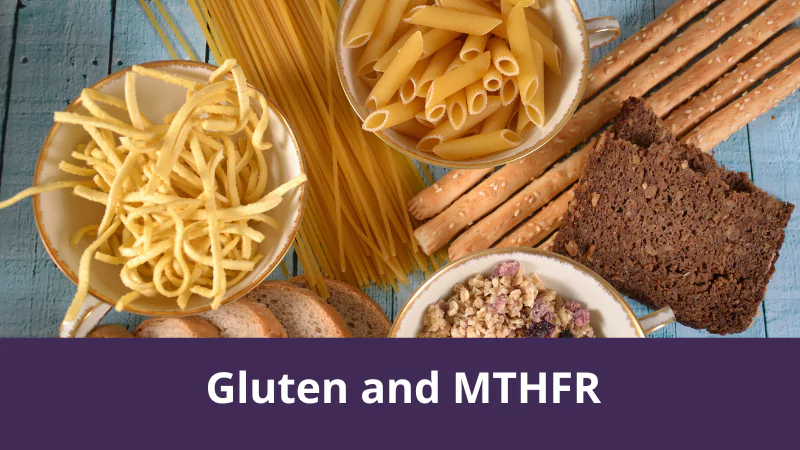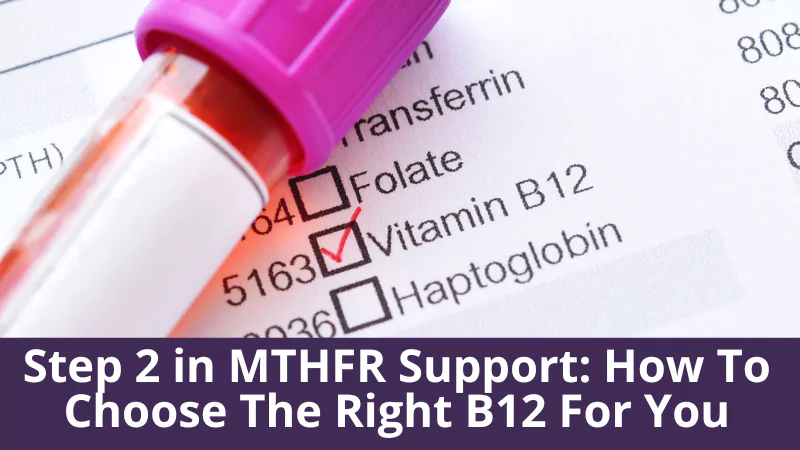Gluten is ubiquitous in many processed foods of today, this should come as a concern, as it negatively affects some of us without ever knowing it is the cause. Individuals with gluten sensitivity and MTHFR can be dealt a double blow where the conditions of both symptoms may amplify each other.
We will look at what gluten is used for and what conditions may develop for those who have a sensitivity to it. We will also be looking at how it affects those with MTHFR and what should be done to reduce its effects.
What is gluten and what does it do?
Gluten is a protein in wheat, barley, and rye. Wheat is a grain used as an ingredient, most commonly in breads, pastas, and cereal. Wheat appears in many types of foods from sauces to certain meats additives and various items one would not expect to find wheat, which is why it is important to always check the ingredients list. Barley is commonly found in beer and in foods containing malt. Rye is most often found in rye bread, rye beer, and some cereals. Gluten is used as a binding agent in baking, which helps dough to have an elastic type texture, and will aid the dough rise and provide a chewy consistency.
>>>Free Webinar: Gluten Free Diet & MTHFR
Conditions associated with gluten
Wheat allergy is an immune response to the various proteins present in wheat, gluten being the main culprit. Wheat allergies usually begin in early childhood where the symptoms reduce with age in most people. The symptoms of wheat allergy can span from minor to severe, depending on the individuals immune response. Symptoms of wheat allergy include nausea and vomiting, diarrhoea, stomach pain and cramping, irritation of your mouth and throat, hives and rash, nasal congestion and eye irritation. Those who are highly sensitive may risk life-threatening symptoms such as difficulty breathing, and in extreme cases, they may go into anaphylactic shock. These individual are prescribed EpiPens (epinephrine injections), for the treatment of anaphylaxis.
Celiac disease is an autoimmune disorder that is genetically predisposed to affect 1% of people. Celiac disease is where your immune system responds abnormally to gluten, where ingesting gluten triggers the immune system to attack the villi, creating excessive inflammation. The villi are microscopic finger-like projections on the intestinal lining that increases the surface area for optimal nutrient absorption. Damaged villi can lead to malnutrition due to the reduced absorption rate.
A reduced rate of nutrient absorption during growing years in children can lead to health problems such as failure to thrive in infants, delayed puberty in adolescents, short stature, irritability, weight loss, and dental enamel defects. Mutations in the MTHFR gene are regularly found in individuals with celiac disease and are associated with severe vitamin malabsorption, premature heart attacks, depression and many other symptoms, which are poorly controlled by the gluten-free diet.
If left untreated more serious conditions may occur such as permanently damaged intestines, type 1 diabetes and intestinal cancers. Those diagnosed with celiac disease are told to avoid gluten completely.
Non-celiac gluten sensitivity; those who don’t have celiac disease and are not allergic to wheat but exhibit the same symptoms after gluten is ingested are known to have non-celiac gluten sensitivity (NCGS). Doctors know little about this condition and currently, there is no test that can diagnose you with NCGS. As this condition becomes more and more apparent, researchers are trying to characterize its mechanism so that NCGS can be better understood. Common symptoms of NCGS are, mental fatigue, also known as ‘brain fog’, fatigue, bloating and gas, abdominal pain, and headache.
How it can affect those with MTHFR
Those with MTHFR and gluten sensitivity can experience the breakdown of gut tissue which becomes leaky and inflamed. A leaky gut allows large undigested molecules to pass into circulation, these substances then trigger an inflammatory response. It is then highly recommended for those with MTHFR to avoid gluten as part of their treatment plan. Avoiding substances that cause inflammation will reduce strain on the body.
A study found that those with hyperhomocysteinemia as a result of the MTHFR C677T polymorphism were more frequent in gluten-sensitive enteropathy (GSE) patients than in control subjects, as well as folate deficiency. Analysis showed that folate and B 12 levels were independently and inversely associated with homocysteine levels. The gluten-free diet was able to normalize folate, vitamin B 12, and homocysteine levels. Vitamin deficiencies caused by malabsorption are the most important determinants of this condition.
FREE Download What is MTHFR eBook
Conclusion
Getting tested not only for MTHFR and avoiding gluten if you gluten sensitivity and testing for homocysteine levels will provide you with a means to take the best course of action. If you have a gluten sensitivity and an elevation in homocysteine then it is crucial to adopt a strict gluten free diet, so getting into the habit of reading food labels to determine gluten content will be beneficial. In addition supplementation with methyl-folate and methyl B vitamins, will aid your elimination, detoxification and methylation systems.
References:
Saibeni S1, Lecchi A, Meucci G, Cattaneo M, Tagliabue L, et al, Gastroenterology and Gastrointestinal Endoscopy Service, IRCCS Maggiore Hospital and University of Milan, 2005, Prevalence of hyperhomocysteinemia in adult gluten-sensitive enteropathy at diagnosis: role of B12, folate, and genetics.
<https://www.ncbi.nlm.nih.gov/pubmed/15952099>
Gluten Free Remedies, 2017, Deficient Methylation Process Frequently Found in People with Celiac Disease
<http://www.glutenfreeremedies.com/deficient-methylation-celiac-disease/>
Catassi, C., 2015. Gluten Sensitivity. Annals of Nutrition and Metabolism, 67(s2), 16-26.
<http://www.karger.com/Article/FullText/440990>
What is gluten? (n.d.).
<https://celiac.org/live-gluten-free/glutenfreediet/what-is-gluten/>
What is non-celiac gluten sensitivity? (n.d.).
<https://www.beyondceliac.org/celiac-disease/non-celiac-gluten-sensitivity/what-is-it/>









